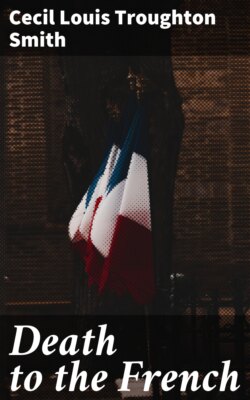Читать книгу Death to the French - Cecil Louis Troughton Smith - Страница 4
На сайте Литреса книга снята с продажи.
CHAPTER 2
ОглавлениеTable of Contents
Rifleman Matthew Dodd was already aware that he was cut off, although at the moment he was too occupied in saving his life to consider the consequences. He had been making his way back through the olive groves to his picket when he had heard strange voices ahead and had glimpsed strange uniforms. Bent double, and sweating under his pack, he had scurried through the undergrowth in the valley trying to make his way round the enemies who had interposed across his line of retreat. Half an hour of violent exertion had, he thought, brought him clear, when at that very moment a shout told him that he was observed by some other detachment. A musket rang out not far away from him and a bullet smacked into a tree-trunk a dozen yards away. He turned and ran again, uphill this time, in a direction which he knew took him away from his friends but which alone, as far as his skirmisher’s instinct told him, was still not barred by the French advance guard. There were more shouts behind him and a crashing among the undergrowth which told him that he was closely pursued by a dozen men.
He dashed along up the steep slope, his pack leaping on his back, and his ammunition pouches pounding on his ribs. Soon he emerged from the olive grove on to an open, heather-covered hillside. There was nothing for it but to continue his flight without the protection of the friendly trees—either that, at least, or to turn back and surrender, and Dodd was not of the type which surrenders too easily. He ran heavily up the hill. Twenty seconds later the first of his pursuers reached the edge of the grove, and had him in clear view. They raised their muskets and fired at him, one after the other as they came up, but Dodd was a hundred yards away by now, and no one could hope to hit a man a hundred yards away with a musket, especially when panting from heavy exertion. Dodd heard the shots, but hardly one of the bullets came near enough for him to hear it. He climbed on up the steep slope until, when the last shot had been fired, he deemed it safe to spare a moment to glance back. Half a dozen Frenchmen were reloading their muskets; half a dozen more were starting up the hill after him. Dodd plunged forward again through the clinging heather.
The hill, like all the hills in Portugal, was steep and rocky and seemingly interminable, rising bleakly up from between two wooded valleys. He laboured up it, his steps growing slower and slower as the slope increased. Halfway up he stopped and looked back again.
The Frenchmen had ceased their pursuit and had drawn together to go back down to the road. Dodd’s jaws clenched hard together. He threw himself down among the heather and pushed his rifle forward; an outcrop of rock provided a convenient rest. He cocked the rifle, saw to it that the priming was still in place, and then looked along the barrel. Although a musket might miss a house at a hundred yards, the rifle could be relied on to hit a group of men at twice that distance. He pressed the trigger, and the flint fell. The priming took fire—in dry weather not more than one shot in ten missed fire—and the rifle went off. Through the smoke he saw one of the Frenchmen down the slope lurch forward and fall, rolling down the incline a little way before he lay still.
A yell of rage went up from the Frenchmen and they turned to pursue him again, but Dodd leaped to his feet and ran once more up the slope. One or two ineffectual shots were fired after him, but they went wide. And after a hundred yards or so more the Frenchmen abandoned the pursuit again, and went back to where some of them were still stooping over the wounded man.
Dodd had taken his revenge for being chased off his best line of retreat. It was annoyance at this fact which had caused him to fire that parting shot, for in the Peninsular War casual shootings were not encouraged by high authority: the general commanding in chief had confidence in the persistence of the ‘offensive spirit’ among his men without any additional stimulus.
